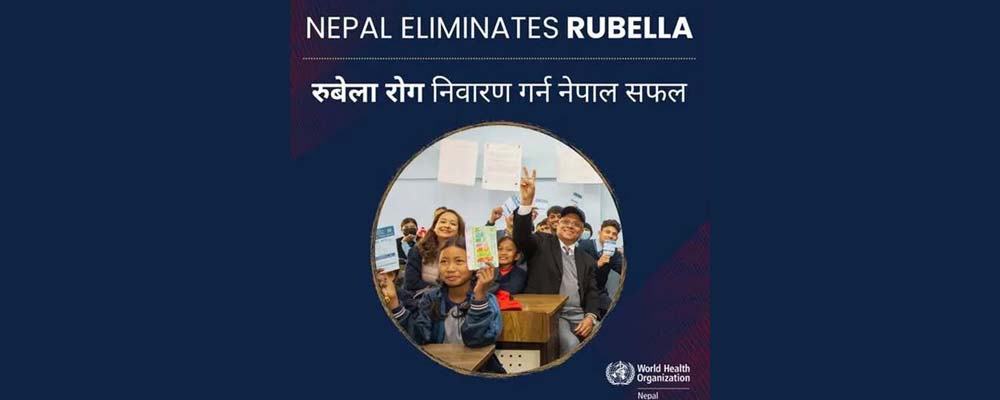
Nepal Achieves Rubella Elimination
Nepal has officially eliminated rubella as a public health problem. The World Health Organization (WHO) announced Nepal’s success, making it the sixth country in the South-East Asia Region to achieve this milestone.
WHO described this as a remarkable achievement, stating that it is the result of Nepal’s “sustained and strong commitment to immunization against vaccine-preventable diseases.”
Dr. Abhiyan Gautam, Chief of the Immunization Section at the Department of Health Services, informed that Nepal successfully completed all stages set by WHO to declare rubella elimination.
He explained that elimination means stopping the spread of the disease from person to person, and WHO only made the official declaration after field verification in Nepal.
“WHO selected Parsa and Parbat districts for evaluation. The declaration was based on five pillars: prevalence, laboratory performance, surveillance, and high vaccination coverage,” Dr. Gautam said. He noted that rubella, which resembles measles, is highly contagious and can cause complications in pregnant women, including miscarriage, stillbirth, or lifelong disabilities in newborns.
Dr. Katharina Bohm, Acting Director of WHO’s South-East Asia Regional Office, highlighted that Nepal’s success reflects strong leadership commitment, the dedication of health workers, continuous support from Female Community Health Volunteers, and the engagement of the general public.
She stated that this achievement ensures children a healthier start to life and a rubella-free future.
The Regional Verification Commission for Measles and Rubella Elimination approved Nepal’s elimination status following its annual meeting from July 21–23, 2025 (2082 Sawan 6–8).
The Commission endorsed the recommendation of Nepal’s National Verification Committee after reviewing data on disease surveillance and vaccination coverage, confirming the elimination of rubella from the country.
Minister for Health and Population, Pradeep Poudel, remarked that Nepal’s success in eliminating rubella ahead of the regional target is another milestone of the National Immunization Program.
He emphasized that immunization has remained a strong pillar of Nepal’s health system and expressed gratitude for the continued support of Gavi, the Vaccine Alliance, and WHO in strengthening Nepal’s immunization and health programs.
Nepal introduced rubella vaccination into the National Immunization Program in 2012 through a nationwide campaign targeting children aged 9 months to 15 years.
-
In 2016, the second dose of rubella vaccine was added to the national immunization schedule.
-
Despite challenges such as the 2015 and 2023 earthquakes and the COVID-19 pandemic, Nepal successfully carried out rubella vaccination campaigns in 2012, 2016, 2020, and 2024.
-
By 2024, Nepal had achieved more than 95% coverage of the first dose of rubella vaccine among children.
These campaigns significantly expanded access to life-saving vaccines across the country.
Dr. Rajesh Sambhajirao Pandav, WHO Representative to Nepal, stated that this major public health achievement is the outcome of strong and effective collaboration between the government, health workers, partner organizations, and local communities.


